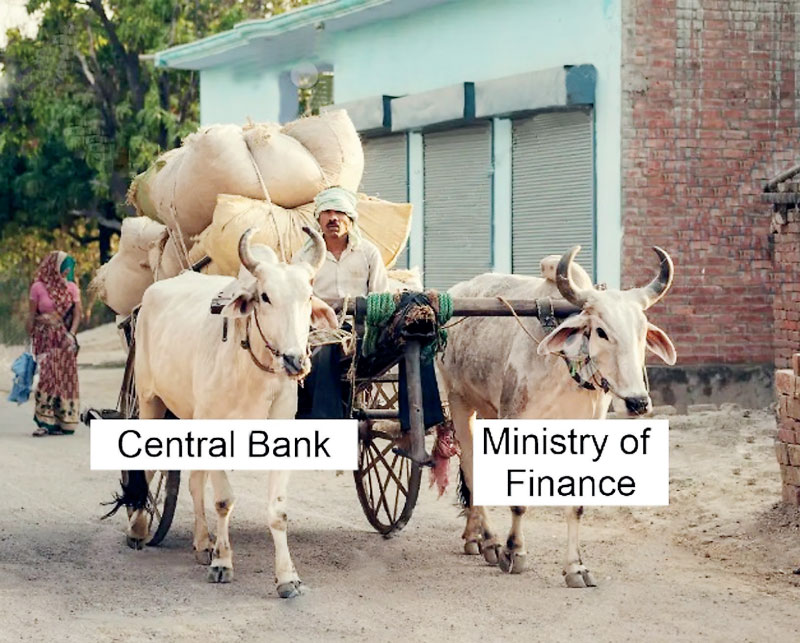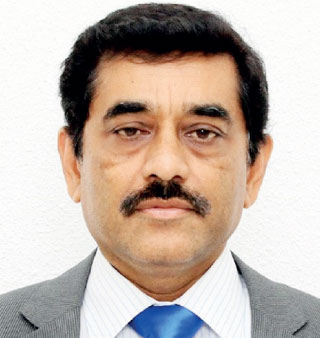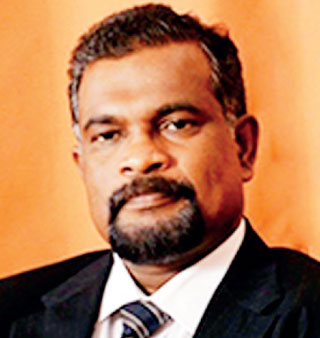Monday Feb 16, 2026
Monday Feb 16, 2026
Friday, 29 April 2022 00:00 - - {{hitsCtrl.values.hits}}

 It is a matter for solace that the Government has prudently taken a decision to appoint an experienced and competent Governor with a sound track record for the Central Bank (CB). He is none other than Dr. P. Nandalal Weerasinghe who relinquished duties from the CB as a senior deputy governor after an extensive service of over three decades.
It is a matter for solace that the Government has prudently taken a decision to appoint an experienced and competent Governor with a sound track record for the Central Bank (CB). He is none other than Dr. P. Nandalal Weerasinghe who relinquished duties from the CB as a senior deputy governor after an extensive service of over three decades.
The appointment of this senior official undoubtedly has created a sense of confidence and trust among the people and other stakeholders in that he would make significant changes with a view to shoring up the crumbling image of the CB. Our best wishes to Dr. Weerasinghe and his able lieutenants for having successfully addressed the issues and helped overcome the crisis as much as they could.
At the first meeting of the monetary board itself, he has taken a far-reaching decision to control the ever increasing inflation which is unofficially hovering over 40% by increasing the policy interest rates from 7% to 13.5% which will have a cascading effect on the economy and financial market. It must be admitted that that the idiotic measures adopted by the previous two governors, led to aggravating economic mess that Sri Lanka was already experiencing during the last few decades.
They were impervious to realities of the economy and money market and they bellowed rhetoric and adopted idiotic measures to worsen the situation. Instead of arresting the worsening economic and financial situation, they pathetically failed to arrest the economic downturn and the CB too earned a notoriety for the callous disregard for people’s grievances at a time when the people are struggling to make ends meet.
 |
| Central Bank Governor Dr. Nandalal Weerasinghe |
 |
| Ministry of Finance Secretary Mahinda Siriwardena
|
It is in this background, the appointment of the new governor has to be viewed. It is unfair for us to expect miracles in the short term from the CB governor. One might tend to think that the appointment of the new governor is the panacea for all the economic and monetary woes the country is grappling with. It is not so. There are a lot of things outside the legitimate purview of the CB governor. Anyone with a rudimentary knowledge of the basic economics could figure out what the CB governor can and cannot fulfil given his mandate as the CB governor. There cannot be haphazard micro-solutions to the macro problems the country is saddled with.
I have made an attempt to enlighten the readers in simple terms of the legitimate role that the CB governor can accomplish to ameliorate the suffering of the economy.
Basically, any economy has two sectors, namely the “monetary sector” and the “real sector”. It is akin to a bullock-cart driven by two bulls. Say, one bull represents the monetary sector that’s headed by the Central Bank. Monetary sector key components are monetary variables such as interest rate, exchange rate, money supply, etc. The Central Bank has full control over policies that affect the functioning of the monetary sector. The CB is given full powers to introduce policies that affect key macro monetary variables that lead ultimately to achieve a stable and growing economy.
The other bull in the bullock-cart represents the real sector. The real sector referred to in economics is commonly known as the “fiscal sector”. Key components relating to the real sector are Government income and expenditure, savings and investments, etc. These real sector variables are directly affecting economic output or in simple terms production and delivery of goods and services. The management of the real sector is undertaken by the Cabinet through the Ministry of Finance. For example, the decisions relating to tax policies, prioritising Government expenditures and investments are taken care of by the Cabinet through the Ministry of Finance and the Treasury. Given the inherent weaknesses of the structure of the cabinet, the Ministry of Finance has a pivotal responsibility to take care of policies that are required to ensure a well-functioning real sector.
Two bulls, the financial sector and its instruments on the one side and the real sector on the other side, are pulling the cart independently. However, they need to ensure that a joint force is applied to move the cart forward. This being a very turbulent situation that the two bulls will have to move the cart forward cautiously with tacit understanding because ill-logical and imprudent political, monetary and fiscal policies taken by successive Governments that have aggravated the issues to a tipping point what the country has never seen in its history for the last 74 years.
This literally means that the two bulls will have to pull the cart up a steep hill ahead. Two bulls (Governor of the Central Bank and the Secretary to the Ministry of Finance) have herculean tasks to be accomplished in the next couple of years. It is to be explicitly mentioned here that the success of moving the cart forward does not hinge on one bull. It is therefore crucial that both bulls have to become two equal prime-movers to pull the economy in this difficult terrain for a common goal.
We can say the heads of the Government such as the president and the prime minister are the ones who are directing the cart with canes in their hands to correctly direct and encourage the two bulls to get into the Government’s overall target. Government overall target is to ensure a trouble-free economy and upliftment of people’s welfare. The economic and financial woes that the country is undergoing now are the cumulative result of the irresponsible monetary and fiscal blunders committed by the current regime.
Readers would recall that no sooner this Government came into power; it gave unwarranted tax concessions to their cohorts at the cost of the revenue to the country. The famous sugar scam denied billions of revenue to the national coffers. The diversion of billions of dollars on Ozymandian projects like the Hambantota Harbour, the Suriyawewa cricket stadium, the Mattala Airport and the Lotus Tower does not yield an adequate economic rate of return for the investment made which, in turn, has aggravated the foreign exchange woes today.
In this context, the appointment of a former member of CB to the position of Secretary to the Ministry of Finance is certainly a bold and a sensible step so that both the governor of the CB and the Secretary to the Ministry of Finance could perform their onerous duties hand and glove for a common objective.
The Central Bank as the monetary authority should act in a more responsible manner in handling monetary targets of stable price, and exchange rate fluctuations, etc. But the Central Bank cannot interfere with the decisions relating to the real sector or fiscal sector. On the other hand, the Ministry of Finance has full authority to make decisions relating to the real sector. But they have no control over interfering with the Central Bank and its monetary policy instruments. What is important is that they are supposed to have good coordination although they act independently.
It was a pleasure to note that Dr. Weerasinghe in his press conference outlined his policy instruments and mentioned that the two institutions i.e. CB and the Ministry of Finance, will work closely together. In my view this is good news. But not enough. We now only know his strategies. In order to overcome the current crisis, strategies affecting the financial sector are not adequate. To be successful in this massive operation, a well-designed policy package affecting the real sector or a fiscal policy package is also essential. If one bull does his job properly while allowing the other bull to drag on, the desired targets cannot be achieved. Therefore, the general public expects the Secretary to the Ministry of Finance to also come forward with a policy package involving his strategies to supplement the CB policy package, and explain it to the stakeholders.
That’s not the end of the story. Overcoming the current crisis as soon as possible is one thing. Driving the country into a new and sustainable growth path is another aspect. Ensuring that proper policies are designed and implemented to turn the current import dependent economy to a more production-based economy is essential to fulfil the long-term targets of a stable economy and improving the quality of life of the general public of Sri Lanka. The role of political leadership is to facilitate efforts by CB and the Ministry of Finance and other relevant parties, and not to sabotage it by way of sinister political gains.
I wish leaders the best of luck to bring the country back on track and ensure at least our children will enjoy a prosperous country that they deserve.
The writer is a former Senior Lecturer at the University of Sri Jayewardenepura and former Principal Economist, Ministry of Transport, New Zealand and could be reached via email at [email protected]